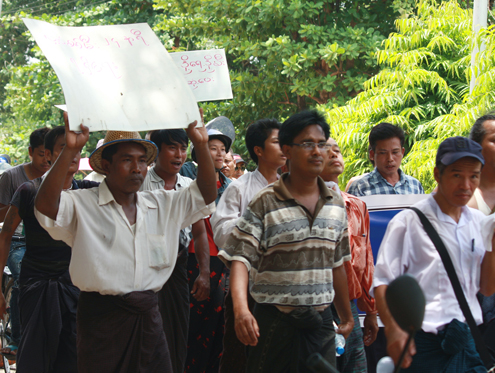Protesters demanding sufficient energy supplies in Pegu division’s Prome [Pyay] township were attacked today by riot-police who assaulted three of the demonstration’s leaders and arrested four confirmed participants.
Kyaw Hsan, an organising committee member at the National League for Democracy’s Prome office, said an estimated 300 protesters marched from the town’s electrical department, but were stopped along the way by about 100 riot police.
According to witnesses, the riot police initially arrested five people during the brief crackdown. The officers reportedly assaulted three people – one of them a child, who was later released.
The four arrested protestors were identified as Ju Ju, Kyaw Shwe, Win Hlaing and Zaw Htun.
The demonstrators were allegedly taken to Prome Police Station-2.
An unconfirmed report has also surfaced that an unidentified protester was also arrested.
Officials told protestors that the detainees would be prosecuted for staging a demonstration without receiving the required permission from authorities.
While demonstrations are technically legal in Burma, permission to publicly protest must be sought five days in advance and applications can be rejected at the discretion of authorities. Slogans must pre-approved and anyone found in breach of regulations can potentially spend a year behind bars.
An official from Police Station-2 said the detainees were directly handled by district-level police and were not taken to their facility.
A supervising officer from the district’s police department said he was unaware of the incident because he had not worked during the morning shift.
One of the protesters who waited outside of the police station said Union Solidarity and Development Party officials and elected parliamentarians arrived at the location and promised to bail out the detained protesters.
According to reports from Eleven Media Group, during a press conference at the Presidential Advisory Board’s office in Rangoon today government official Ko Ko Hlaing weighed in on the country’s electrical shortages.
“All but two of the 40 nuclear facilities in Japan have gone offline – but there’s no electricity shortage there because the people know how to conserve [electricity],” said presidential advisor Ko Ko Hlaing.
“So out of goodwill, I would like to suggest the [Burmese people] to light those candles at their homes instead and turn off the [electrical lights] and everything will be alright.”
The advisor later encouraged protestors that the upcoming monsoon season would provide a boost to the country’s hydroelectric sector, thus providing more power to Burma’s electrical grid.
“Once it starts raining, we should have enough power to produce the necessary voltage. Hydropower is a no-go without the rain. Since it is already starting to rain, the [problem] should be solved soon,” said Ko Ko Hlaing.
Business sources in Rangoon say a multimillion-dollar deal is being ironed out between the Burmese government and a private Singaporean company to bring in additional diesel generators to provide 250-500 megawatts of power for the Hlantaya, Minglardon, and Shwe Peta industrial zones around Rangoon.
Sources say a sizable percentage of the power will be fed into the domestic grid.
The Assistance Association for Political Prisoners (Burma) said the assault on demonstrators undermines the recent reforms and promises made by President Thein Sein.
“Even though U Thein Sein is being celebrated for supposed democratic reforms, this violent response to a large, peaceful demonstration shows that the government’s mentality has not changed,” said Bo Kyi, Joint-Secretary of AAPP.
While Burmese citizens endure daily energy shortages, the majority of the energy-rich country’s natural gas is continuing to be sold to neighbouring countries. However, a spokesperson from the Chinese Foreign Ministry said Burma’s northern neighbor was willing to assist the country.
“What we understand is that the main reason for the lack of electricity is that Myanmar [Burma]’s power grid system is somewhat outdated,” said Chinese Foreign Ministry spokesperson Hong Lei.
“China is willing to cooperate with Myanmar [Burma] to improve its power grid to help people there improve their lives.”
-Kate Kelly provided additional reporting from Rangoon



